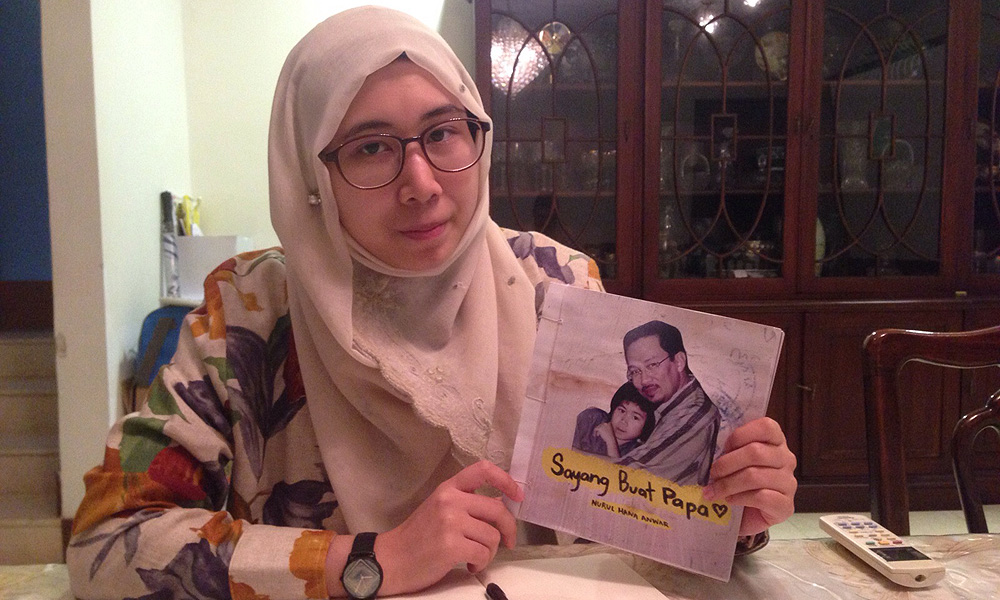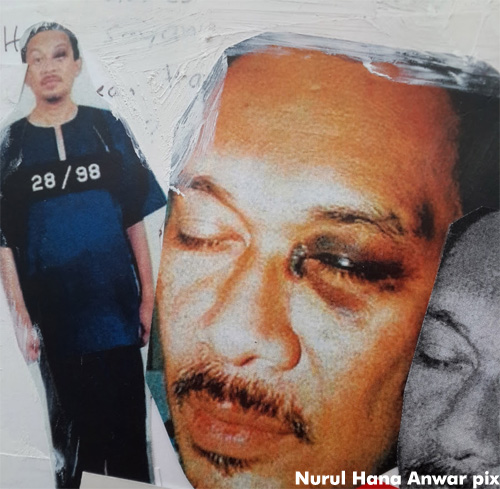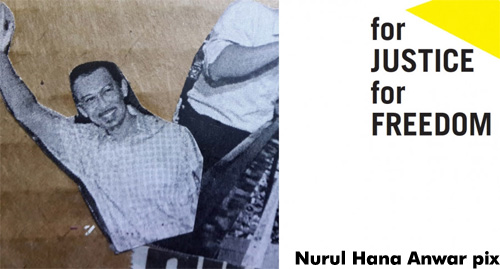She was six years old when policemen with balaclavas stormed their residence in the upscale neighbourhood of Bukit Damansara in Kuala Lumpur on the night of Sept 20, 1998.
Gripped with fear, Nurul Hana Anwar crouched under a table. And when she implored her mother to shed light on the confusion, she was told to pray and have faith in Allah.
Her family later said that a "wicked man" had taken her papa to prison.
The "wicked man" was none other than former prime minister Dr Mahathir Mohamad, who had sacked her father Anwar Ibrahim as his deputy 18 days earlier.
In an interview published in the US-based Public Radio International (PRI), Nurul Hana, now 23, and the youngest of six siblings, recalled the pain of growing up with her father in prison.
 She has penned a book, titled 'Sayang Buat Papa (Love for Papa)', which was released in August.
She has penned a book, titled 'Sayang Buat Papa (Love for Papa)', which was released in August.
In the book, Nurul Hana describes the night of her father's arrest:
"I was awakened by noise and commotion, which made me confused but curious. I wanted to know why these unfamiliar sounds came at this late hour of night, when everyone should be asleep.
"My aunt who took care of me quickly locked the door… I jumped out from bed and quickly unlocked the door. My aunt tried to stop me, but she was too late; I was already outside the room."
As for what motivated her to write, Nurul Hana said she wanted the world to see her father in a different light.
"No one has published stories about dad from a family's point of view … People usually see him as a politician; I just see him as my dad who is wrongfully convicted. People haven't seen him as a father or a grandfather.
"They don't know that he sings lullabies to his grandchildren, or the little things like, when we have dinner or lunch together, everyone has to be there if you are at home. Especially during Ramadan, we always break fast together."
 In 1999, Anwar was sent to prison in connection with a sodomy charge, which he claimed was fabricated by Mahathir and his inner circle. He spent five years in prison.
In 1999, Anwar was sent to prison in connection with a sodomy charge, which he claimed was fabricated by Mahathir and his inner circle. He spent five years in prison.
He was released after the Federal Court overturned his conviction, and Nurul Hana said it was only then, at the of 12, did she learn the reason for her father's imprisonment after reading the news.
"I slowly put the pieces back together."
"'What is this?' I thought. I didn't tell anyone because I was supposed to know this, and I didn't tell my mum because I did not want to burden her."
Her book emerged from a collage project, which included newspaper clippings, letters and photos.
According to Nurul Hana, it was a way to stitch together bits and pieces of her memories.
"I poured out all of my emotions (into the collage) and it really helped, because I've been keeping it in for such a long time."
"I had a normal childhood for six years, but the sad thing is that dad didn't see me grow up from age six to 12, and that's kind of when you need your dad."
Nurul Hana said her professor in New York had assigned her class a collage project and she decided to focus on her father's arrest in 1998 and his second trial.
She also disclosed that when she attempted to create an artwork about her father as a secondary school student in Malaysia, the school administration made her stop, out of fear of courting trouble.
 In order to initiate the collage project, Nurul Hana said, she had to open a folder, the contents of which she had not touched in more than a decade, in her laptop. It contained letters between Anwar and her during his incarceration.
In order to initiate the collage project, Nurul Hana said, she had to open a folder, the contents of which she had not touched in more than a decade, in her laptop. It contained letters between Anwar and her during his incarceration.
"I started crying and just let it all out," she said.
Anwar is currently serving another five years in prison over his second sodomy conviction, which he also claimed is trumped up by his political rivals.
Nurul Hana continued to work on the collage during the trial, wanting to present it to her father when she returned to Malaysia for the final verdict.
When she revealed it a day before the court case, her family was surprised while her mother and siblings could not hold back their tears.
"It was the first time I talked about how I felt about everything."
"You can't really see (my dad's) reaction in person, you see it more in his writing - a typical dad, you know. He wrote a letter later saying that he was really proud of me."
And when the verdict was announced, she was speechless. "I couldn't really speak," she recalled. It was a moment which the PRI article described as the same silence that befell Nurul Hana as a six-year-old.
Related reports

